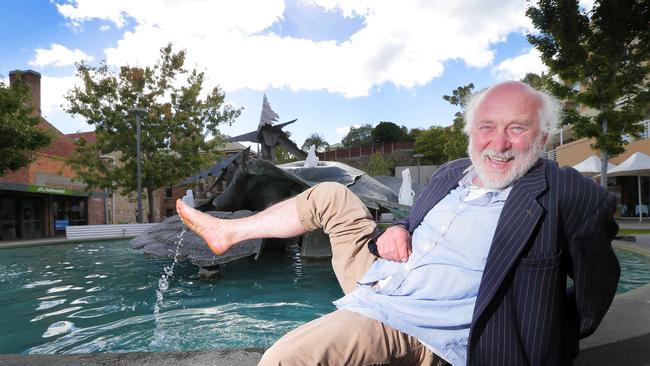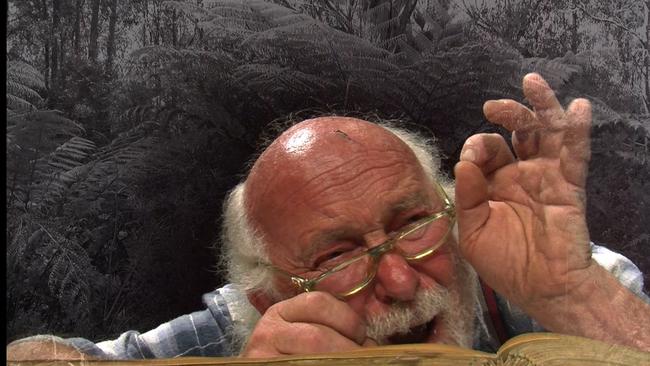Laughter workshop in Hobart shucks off inhibitions
It’s not easy being a cliche, but laughing gives us the chance to shuck off your inhibitions — and in actor Justus Neumann’s case help to tackle calamity, Danielle Wood writes.

Tasmania
Don't miss out on the headlines from Tasmania. Followed categories will be added to My News.
It’s not easy being a cliché. You know: being about as welcome as a bad fairy at a christening, treated like chewie on someone’s boot, and generally avoided like the plague.
Clichés take a fair bit of stick in writing circles, but I’d like to stick up for them.
After all, many clichés – once upon a time – were fresh and beautiful things. New-minted, they struck people with their aptness, their brevity, their wit and/or wisdom.
It’s hardly their fault they’ve aged, been overused or become a little stale.
The writer Hephzibah Anderson said, after thinking a great deal about clichés, that she admires them for their ‘sturdy truthfulness and comforting ancientness’.
The cliché I’ve been thinking about lately – ‘laughter is the best medicine’ – comes close to ticking both Anderson’s boxes.
It’s certainly old; the internet gives credit for its coinage to the 13th century French medic, Henri de Mondeville, who is said to have promoted the idea of using laughter to distract surgical patients and speed their post-operative recovery.
And as for its truthfulness? Well, laughter may not be the ‘best’ medicine for every complaint, but research indicates it’s a pretty useful and versatile remedy.

Norman Cousins – the American journalist, writer and world-peace advocate who, in the last years of his life, joined the medical faculty at UCLA and wrote a pioneering book about his experience with a debilitating connective-tissue disease – was very sure about laughter’s health-giving benefits.
“Laughter is a form of internal jogging. It moves your organs around. It enhances respiration. It is an igniter of great expectations,” he wrote. And, the centre founded in his name at UCLA continues to study and champion the importance of humour and psychological attitude in healing.
Closer to home, the Tasmanian-based actor and theatre-maker Justus Neumann has lately been awoken to the benefits of laughter as therapy.
I first met Justus in 1994, when he walked into The Mercury offices – then in Macquarie St – wearing a pair of patent-leather clown shoes and sporting a dramatic, clownish ruff of white hair.
At the time, he was creating Circus Bruny, an extraordinary event which brought to Tasmania theatre professionals from Justus’s native Austria, and trained up Bruny Island adults and children to perform alongside them.
In the years since then, Justus has split his time between Vienna and Adventure Bay, making theatre which is sometimes poignant, sometimes hilarious, and oftentimes both at once.

Two years ago, Justus was diagnosed with Parkinson’s Disease. For an active man, an actor, a traveller, a husband, father of four children including a very young daughter, this was, he said ‘a calamity’.
“In my search to tackle this calamity,” he wrote to me, “I found numerous scientific articles and studies supporting activities such as laughing, singing, humming and dancing, that promote positive benefits.”
The benefits of laughter include reducing stress hormones, promoting mood-enhancing hormones, strengthening the immune system, and reducing blood pressure, anxiety and anger. It enhances relationships, counters depression, enhances memory, creativity, attractiveness and social cohesion.
But how do you just … laugh? What if nothing seems particularly funny? As a theatre professional, Justus has a bit of a head-start over the rest of us because he’s always been able to perform laughter.
Here’s where another cliché comes into play: fake it until you make it. Justus has learned that whenever he feels low, it significantly helps to make himself smile or laugh.
And his experience, that making yourself smile and laugh gives you the same benefits as spontaneous smiling and laughter, is borne out by the science.

New York-based neurologist Dr Isha Gupta confirmed that the act of smiling increases the smiler’s levels of feel-good hormones serotonin and dopamine. A study at the University of South Australia, led by Fernando Marmolejo-Ramos, confirmed that even fake smiling can make you feel better.
“When your muscles say you’re happy, you’re more likely to see the world around you in a positive way,” Dr Marmolejo-Ramos says.
“In our research we found that when you forcefully practise smiling, it stimulates the amygdala – the emotional centre of the brain – which releases neurotransmitters to encourage an emotionally positive state.
“For mental health, this has interesting implications. If we can trick the brain into perceiving stimuli as ‘happy’, then we can potentially use this mechanism to help boost mental health.”
To share the laughter with others, Justus has started holding laughter workshops in Hobart. They’re a chance to shuck off your inhibitions and learn to get yourself laughing in different ways.
Like a horse, for example. Or, like an old man with no teeth. Justus asks participants to experiment with a shy laugh, a story laugh (the sort that sounds like a narrative, but has no real words), a kookaburra laugh, a silent laugh, a splatter laugh and a snort.
Participants also get to play around with scat singing, improvisation and various forms of silliness, all in the name of improved mood and health.
From the very first day I met him, I’ve known Justus as a wonderful laugher. Fortunately, this aspect of his personality is magnificently contagious.
Justus’s next Laughter Workshop will be held at Second Echo Ensemble, 228 Liverpool St, at 11am on Sunday, February 2. For more information, call 0402 421 834.
Danielle Wood is an acclaimed Tasmanian author who has had great success writing under various pen names during the past two decades.
Originally published as Laughter workshop in Hobart shucks off inhibitions



